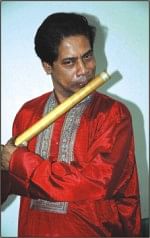Bari Siddiqui unplugged

Bari Siddiqui
Do bring your flute along when you come next time," I requested Abdul Bari Siddiqui.
Bari in spite of his busy schedule kept his word. The melodious “Brindaboni Sarang” raga he played in between, unsurprisingly soon drew an audience into my office.
"The flute has six holes cut out smoothly in a bamboo. The instrument is difficult to master. One has to be adept in placing the fingers to produce the perfect notes. Which is why, even in India one would hardly find more than 20 flutists and about not more than four professional players," said Bari.
"The two varieties of flute are "Mohon bashi" and the "Ar bashi," which range from 7inches to 5 feet." The flute was used previously as an accompanying instrument in folk songs. Pandit Panna Lal Ghosh used the flute in Hindustani classical music. He developed a longer bansuri (flute), 5 feet in length, to generate lower sounds and more subtle expressions, while the short bansuri was used for folk songs.
Bari's love of the flute began at the age of five when his elder brother returned from the weekly haat with a small banshi. Little did he know that one day he would be recognised as an eminent musician across the country.
In fact Bari's reputation has extended beyond Bangladesh. He has performed and conducted workshops in France, Switzerland, Malaysia, Pakistan, Iran and Singapore.
Bari comes from a family of musicians. His formal vocal training began at the age of 12 under Gopal Dutt of Netrokona. His career took off in earnest in 1981, when renowned Usad Aminur Rahman spotted Bari during a concert, and offered to tutor him. Ustad Aminur Rahman was a direct disciple of Pandit Panna Lal Ghosh (1911-1960), the pioneer flutist who had popularised the flute in the subcontinent.
For the next six years Bari trained under Rahman. His Ustad's house was frequented by the contemporary legends. "Devendra Muddreshshor, Director All India Radio, (also the son-in law of Pandit Panna Lal Ghosh), V G Karnaad, Daagar Brothers, Mohiuddin Veenkaar, Ustaad Asad Ali Khan Veenkaar, Pandit Sriram Tewari and many other stalwarts would often come to perform and stay as guests of honour in Aminur Rahman's house. Barrister Tawfique Newaz, son of Rahman would train me in the different technical aspects of Alaap," went on Bari. "At one stage I went over to Pune and got professional tutelage under VG Karnaad," asserts Bari.
Being in an environment surrounded by musical maestros, Bari, not surprisingly spent his waking hours immersed in music, either listening to the greats or rehearsing his lessons for hours at end.
After graduating from Dhaka University, Bari joined the BTV in 1985/86. Besides playing the flute, he slowly also shifted to music direction and vocal performances.
"A flute piece to a song is like a glittering necklace on a lady complementing and augmenting the inert beauty.
"However, lately I felt that my capabilities were not fully utilised as an accompanist. Therefore, I grabbed the offer to sing in Humayun Ahmed's film. I was awarded the BACHASAS award for my music direction in “Sraban Megher Din” for the song “Showa Chan Pakhi”. My next folk album titled “Lokhkho Tara” was released on Pahela Boishak the following year, " points out Bari.
What is the difference between the Indian and European flute? "Indian music comes from silence whereas the European, from sound," says Bari. "The Indian way is definitely more melodious with miir, (the sweet curves and filigree works) and more natural. The European style is slightly restless. The European flute is known as Silver Flute, and ours is the typical natural bamboo flute".
The one concern Bari has is that the flute may become a dying art because of the industry's inability to draw new talent. As a performing art, it does not even have a place in any National Awards category.
Despite his concerns, Bari continues to play with a passion. He performs and continues to develop his skills like any true artiste at heart. In the process, he continues to enthrall his audience and treat them to the intricacy and intensity for which he has won acclaim.

 For all latest news, follow The Daily Star's Google News channel.
For all latest news, follow The Daily Star's Google News channel. 



Comments